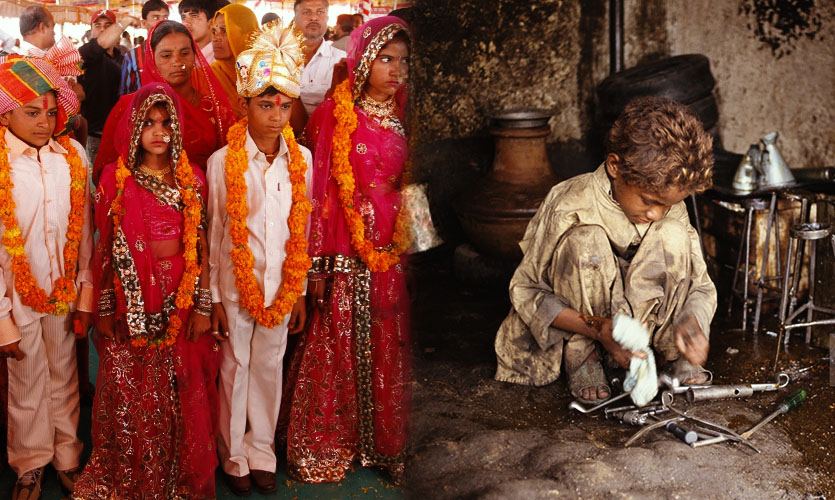Almost every country has the ‘right to live freely’ as their fundamental right today. However, millions of children and adults are still being exploited for other people’s commercial and personal gains.
The United Nations (UN) has shared data confirming that last year around 50 million people were trapped in ‘modern slavery’. The data was released in the Global Estimates of Modern Slavery, published by the ILO, the International Organization for Migration (IOM), and the international human rights group Walk Free. It has revealed that approximately 50 million people globally are victims of modern slavery, among which, 28 million are subjected to forced labour and 22 million into forced marriages.
The last estimated data was recorded in 2016, and till 2021, 10 million more people have fallen in this trap. Among the victims of ‘modern slavery’, 1 in 4 are children, 54 percent are women, and almost 13,000 people were identified as potential victims.
What Is Modern Slavery?
Modern slavery is the exploitation of innocent people for personal or commercial gains of others. The issue is present all around us, but often out of sight. Some of the examples of modern slavery are people entrapped into making our clothes, serving our food, picking our crops, working in factories, or working in houses as cooks, cleaners and nannies.
Normally it looks like a daily chore or job. But these people can become victims of violence and threats, or fall into inescapable debt. For example, a person travelling abroad for a better life who ends up serving at other people’s houses is likely to fall victim to this. There are instances of their employers snatching their passports for menial mistakes, and also threatening them with deportation.
People tend to fall victim to modern slavery often because of their struggles with poverty or insecurity, in order to live a better life, and support their families.
Types of Modern Slavery
- Human Trafficking: The illegal act of transporting people or coercing them to benefit in the work of the higher class, typically in the form of forced labour.
- Forced Labour: Any work forced upon people against their will with the threat of detention, destitution, violence or death, or other forms of extreme hardships to them or their family members.
- Debt bondage/Bonded labour: This kind of slavery is still prevalent in many parts of the world, and was once very common in rural areas. When poverty-stricken families fall in a debt trap set by wealthy people, they are forced to work without pay till the debt is paid.
- Descent-based slavery: Here people are treated as property where their slave status passes down along the generations.
- Slavery of Children: The exploitation of children for someone else’s gain.
- Forced and early marriage: Forced and early marriage is also categorised under modern slavery. This is seen when someone is forced to marry against their will and cannot leave, like in child marriages.
UN Contribution Towards The Cause
According to UN data, approximately 86 percent of forced labour cases come from the private sector. Along with forced labour, there have been cases of commercial sexual exploitation. These comprise about 23 percent of the cases, in which four out of five victims are women.
One of the top ILO officials said, “We know what needs to be done, and we know it can be done. Effective national policies and regulation are fundamental.”
Although implementing government policies and state intervention is just not enough to bring the issue under control. Forced labour or modern slavery requires international standards to provide sound basis and an all hands on deck approach. Trade unions, employer’s organisations, civil societies, and ordinary people have a major role to play in this sector.
The report suggests quick actions to end this trend. Some suggestions include improving and enforcing laws and labour inspections, ending state-imposed forced labour, stronger measures to combat forced labour and trafficking, extending social protection, and strengthening legal protections. A suggestion has also been made to raise the legal age of marriage to 18 in every country, a legislation which should be followed religiously.
The increased risk of human trafficking and forced labour of migrants must be addressed immediately and efficiently. There must be fair and ethical recruitment, and greater support for women, girls and vulnerable individuals.
UN Secretary-General António Guterres said, “This report underscores the urgency of ensuring that all migration is safe, orderly, and regular.”
“Reducing the vulnerability of migrants to forced labour and trafficking in persons depends first and foremost on national policy and legal frameworks that respect, protect, and fulfil the human rights and fundamental freedoms of all migrants – and potential migrants – at all stages of the migration process, regardless of their migration status,” added Guterres, the former UN High Commissioner for Refugees.
He maintained that all of society must work together to “reverse these shocking trends”, including through the implementation of the Global Compact on Migration.
Read more: Sheikh Hasina Urges PM Modi To Take Steps For Repatriation Of Rohingya Muslims To Myanmar










